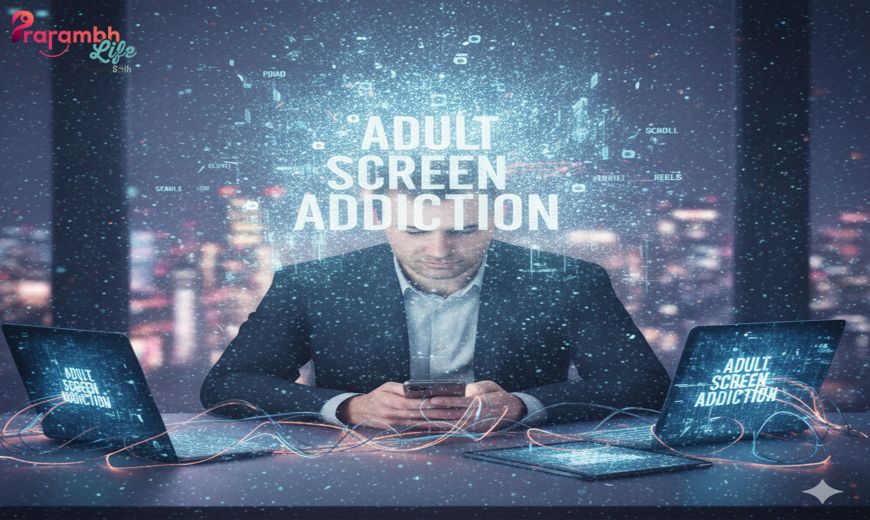
In today’s digital age, screens are everywhere—on our desks, in our hands, even on our wrists. For many adults, technology is no longer just a tool for work but a constant companion. From emails and WhatsApp groups to Netflix binges and endless Instagram reels, our lives are glued to the glow of a screen.
But when does casual scrolling turn into screen addiction? And why does something that feels harmless quickly become a form of self-sabotage?
At Prarambh Life, we understand how powerful and dangerous new-age addictions like screen dependency can be. Just as harmful as alcohol or smoking, adult screen addiction silently eats away at productivity, relationships, sleep, and mental well-being.
What is Adult Screen Addiction?
Screen addiction is not simply about spending long hours online for work. It is the compulsive and uncontrollable urge to use screens—phones, laptops, or TVs—for gratification, often at the cost of real-life responsibilities and health.
Common signs include:
- Reaching for your phone first thing in the morning and last thing at night.
- Endless scrolling even when you promised yourself “just 5 minutes.”
- Losing track of time on reels, games, or OTT platforms.
- Neglecting sleep, meals, or conversations because of screens.
- Feeling restless, irritable, or anxious when not online.
Why Adults Fall into Screen Addiction
Unlike children, who may be driven by games or cartoons, adults often fall prey to screen addiction for deeper reasons:
- Stress Relief: After a long day, endless scrolling or binge-watching feels like an escape from reality.
- FOMO (Fear of Missing Out): Constant notifications and updates make adults feel pressured to stay online.
- Work-Life Blur: Remote working and digital jobs make it hard to separate work screen time from personal screen time.
- Emotional Void: Screens often mask loneliness, anxiety, or dissatisfaction by offering instant distractions.
- Social Validation: Likes, comments, and online interactions create addictive dopamine loops.
How Scrolling Turns into Self-Sabotage
What starts as a harmless pastime soon creates a cycle of self-destruction:
- Sleep Deprivation: Blue light from screens disrupts circadian rhythms, leading to insomnia and fatigue.
- Productivity Loss: Hours wasted on reels or gaming reduce focus at work, affecting career growth.
- Relationship Strain: Partners, friends, and family often feel neglected when screens take priority over conversations.
- Mental Health Impact: Prolonged screen time fuels anxiety, comparison, and even depression.
- Physical Health Decline: From eye strain and headaches to neck and back pain—screen overuse damages the body too.
This is how screens become silent saboteurs, pulling adults away from their potential.
The Psychology Behind Screen Addiction
Screen addiction is more than habit—it’s rooted in neurobiology. Each notification, like, or new reel releases dopamine, the brain’s reward chemical. Over time, the brain craves this constant stimulation, creating compulsive patterns.
Adults often rationalize it as “I need it for work” or “It helps me relax,” but the truth is, the brain is stuck in an addictive feedback loop. Breaking free requires awareness, structured interventions, and support.
Breaking the Cycle: Practical Tips for Adults
- Set Digital Boundaries: Create no-phone zones—like the dining table and bedroom.
- Track Your Screen Time: Use apps that measure and alert you to your daily digital consumption.
- Replace the Habit: Swap scrolling with healthier alternatives—reading, walking, or listening to music.
- Digital Detox Hours: Keep 1–2 hours daily completely screen-free. Start with mornings or before bed.
- Mindful Use: Ask yourself, “Am I using this for purpose or out of compulsion?” before unlocking your phone.
How Prarambh Life Helps You Break Free
At Prarambh Life, we see adult screen addiction as more than just a lifestyle issue—it’s a new-age addiction that deserves structured solutions. Our digital de-addiction programs are crafted to help you reclaim control:
- 3-Month Recovery Plan: Perfect for prevention and low-risk screen dependency. Includes guided activities, AI-powered self-checks, and psychologist touchpoints.
- 6-Month Intensive Plan: For moderate to high-risk addiction. Provides deeper intervention, personalized exercises, and hand-holding support.
- Buddy Program: You can choose a friend, spouse, or family member to accompany you in your journey. Their encouragement keeps you accountable.
- Human + AI Guidance: Our psychologists connect with you regularly, while AI-powered tools monitor progress and suggest personalized coping activities.
- Affordable & Accessible: Unlike expensive rehabs that disrupt work and family, Prarambh Life fits into your daily routine. EMI options starting at just ₹999/month make recovery achievable for everyone.
Why Digital Rehab Works for Adults
Traditional rehab often feels overwhelming for working professionals and homemakers. A digital approach, however, blends seamlessly into daily life:
- No career break: Continue working while managing recovery.
- Privacy assured: Heal without stigma, from the safety of your own home.
- Flexibility: Access sessions and activities anytime, anywhere.
- Personalization: Tailored activities based on your triggers and lifestyle.
Conclusion: From Scrolling to Living
Adult screen addiction is the silent epidemic of our time. It doesn’t scream for attention the way substance abuse does, but its impact on productivity, relationships, and health is equally destructive.
The good news? Just like any addiction, it can be broken. All it takes is awareness, structured guidance, and the willingness to start.
Scrolling doesn’t have to sabotage your life. With the right support, you can replace endless screen time with real connections, mindful habits, and meaningful living.
This is the promise of Prarambh Life’s digital rehab programs—a journey of letting go of compulsions and reclaiming your best self.
If you’ve been caught in the loop of endless scrolling, maybe it’s time to pause. Not just the scroll, but the cycle itself.

